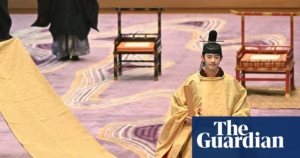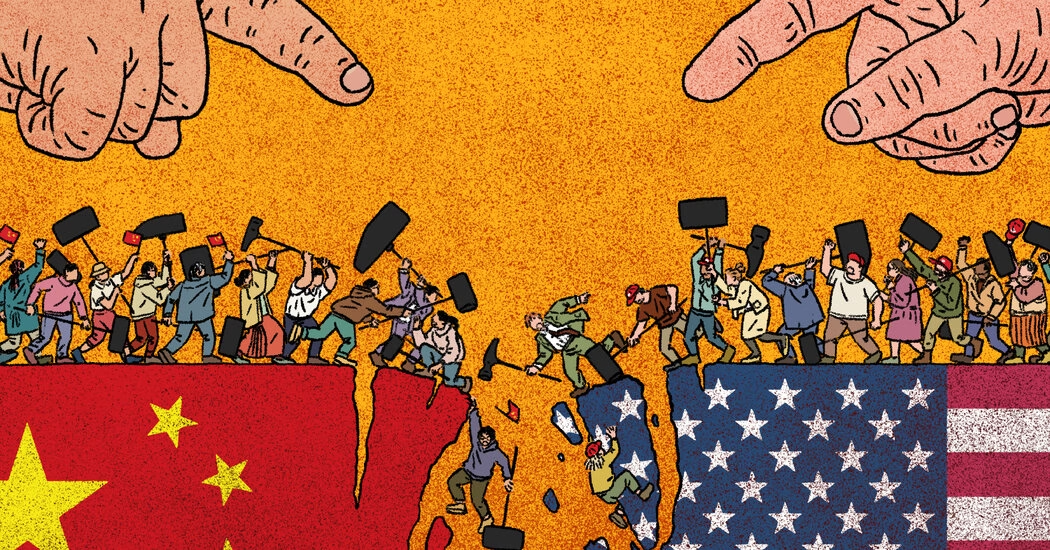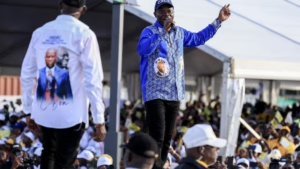President Trump appeared unfazed as his global tariffs triggered stock market crashes and erased trillions in wealth.
“Be cool,” he counseled Americans.
Then, on Wednesday afternoon, amidst financial upheaval – particularly a sharp increase in government bond yields which could threaten the dollar’s dominance and the foundation of the U.S. economy – he caved by pausing tariffs for numerous countries for 90 days.
With this gesture, he inadvertently gave President Xi Jinping of China, with whom he’s engaged in a risky game of brinkmanship that could possibly decouple the world’s two biggest economies and disrupt the global economic order, a point to consider.
It became apparent that Mr. Xi knew his adversary’s weak spot.
Despite how rash and merciless Mr. Trump might seem to some, in Mr. Xi and China, he faces a leader and a party-state with a history of relentless pursuit of policies, even when they resulted in economic and human catastrophes.
Among the Chinese, both critics and supporters of Beijing share the belief that the endgame hinges on which leader can make their people endure suffering for the nation’s sake.
“Tariffs and even economic sanctions do not concern Xi Jinping,” Hao Qun, an exiled Chinese novelist writing under the name Murong Xuecun, wrote on X. “He is not particularly concerned about the hardships tariffs may impose on ordinary people.”
Unlike Mr. Trump, Mr. Xi doesn’t engage with the Chinese public through social media platforms, even though he controls them all. Everything he says and does is orchestrated, making it impossible to discern his true opinion because little is known about him beyond his official persona.
Insights into how he might react in his standoff with Mr. Trump can be gleaned by examining his views on hardship, his relationship with the Chinese public, and his tenure as the leader of 1.4 billion people.
The Chinese internet is rife with nationalist calls for resolute resistance against the United States until the very end.
People shared a video clip of Chairman Mao Zedong discussing the Korean War: “We will fight for as long as they want to fight, and we will fight until we win completely.”
Mao Ning, a spokesperson for China’s foreign ministry, shared Chairmen Mao’s 1964 comments calling the United States “a paper tiger.” “Don’t believe its bluff,” Chairman Mao told a French Parliament delegation visiting China. “One poke, and it’ll burst!”
Some online commentators referenced the Great Leap Forward to illustrate the Communist Party’s ability to enforce austerity during times of hardship. The campaign, launched between 1958 and 1962 to rapidly industrialize China, led to policies that defied science and the laws of nature, resulting in famine and tens of millions of deaths.
While people in the countryside were resorting to cannibalism due to starvation, Chairman Mao instructed farmers to eat grain bran and edible wild plants. “Endure hardship for one year, two years, even three years, and we’ll turn things around,” he said.
Mr. Xi, seen by some Chinese as the successor to Mao, often speaks about the benefits of enduring hardship.
Born into a revolutionary family, Mr. Xi faced political turmoil and hardship at a young age. His father, a vice premier, was purged when Mr. Xi was 9 years old. During the Cultural Revolution, Mr. Xi’s father suffered severe persecution. The son, barely 16, had to leave for a village on the Loess Plateau to live and work as a farmer.
“The seven tough years I spent living and working in the countryside were a great trial for me,” he is quoted as saying in a long feature by the official Xinhua News Agency. “Whenever I encountered difficulties later on, I would think of how, even under such harsh conditions back then, I was still able to get things done.”
In 2023, as China’s economy struggled to recover from the Covid pandemic, with youth unemployment soaring, Mr. Xi advised young people to learn to “eat bitterness,” a colloquial expression for enduring hardships.
In a state media article about Mr. Xi’s expectations for the young generation, the word “hardship” was mentioned 37 times.
It was clear early in 2022 that the Omicron variant was too contagious to contain, yet nearly all other countries that had embraced vaccines had reopened their economies. Nonetheless, Mr. Xi insisted that China adhere to his stringent “zero Covid” measures while resisting the importation of Western vaccines. Hundreds of millions of people underwent lockdowns, daily tests, and forced quarantines. Many lives and livelihoods were ruined.
Over the past few years, Mr. Xi has resisted calls from many economists and some of his officials to provide cash support to the public to boost consumption. In a 2021 speech, he advocated against “welfarism,” stating, “Once welfare benefits go up, they don’t come back down.”
The truth is that 600 million Chinese earn less than $140 per month and have minimal social benefits, a major reason for their high savings and low consumption rates.
Mr. Xi did ultimately end the zero Covid policy, but it was done abruptly without adequate vaccination. Many quickly became infected, older adults died, and long lines formed at crematories.
China’s ongoing real estate slump appears to have pushed Mr. Xi closer to accepting the concept of aiding consumers, though some economists believe it might be too late, especially considering the trade war’s impact.
Mr. Xi does have a vulnerable spot on the economy: He cannot allow things to deteriorate to a point where the Communist Party’s rule is jeopardized. Nationwide protests in November 2022 were a turning point in ending the zero Covid policy. The tariffs threaten China’s exports, which fuel the nation’s economic growth. On Friday, Mr. Xi made his first public comments about the tariff war.
“China’s development has always relied on self-reliance and hard work; never on the charity of others, and never fearing any unjust suppression,” the state media quoted him as saying.
As the world learned this week, Mr. Trump cannot completely disregard the financial markets or the Wall Street and tech billionaires who supported his campaign. They reached out to his cabinet members to voice their concerns. Even loyalists like Elon Musk and William A. Ackman, the hedge fund manager, expressed their disagreement with the president’s tariff policies.
It is difficult to imagine any Chinese businesspeople or entrepreneurs daring to do the same or, like Mr. Musk, having a direct channel to express their concerns to Mr. Xi, who has pushed political opponents aside and clamped down on private enterprises. If Mr. Trump aspires to hold absolute power like Mr. Xi, he has a long way to go.
In recent days, I scouted Chinese social media for any well-known companies or entrepreneurs openly lamenting the trade war, but found none. People who bemoaned pay cuts or business losses due to the tariffs online were shut down by nationalist commenters and labeled “unpatriotic.”
It’s a sentiment that Mr. Trump is clearly unable to match.
“Yielding to hegemony has never been an option for China,” a Weibo user wrote on Thursday. “If we were able to repel the Americans during the Korean War, we have nothing to dread in their tariff threats. We ought to respond with an iron fist.” This comment attracted over 3,000 likes.





